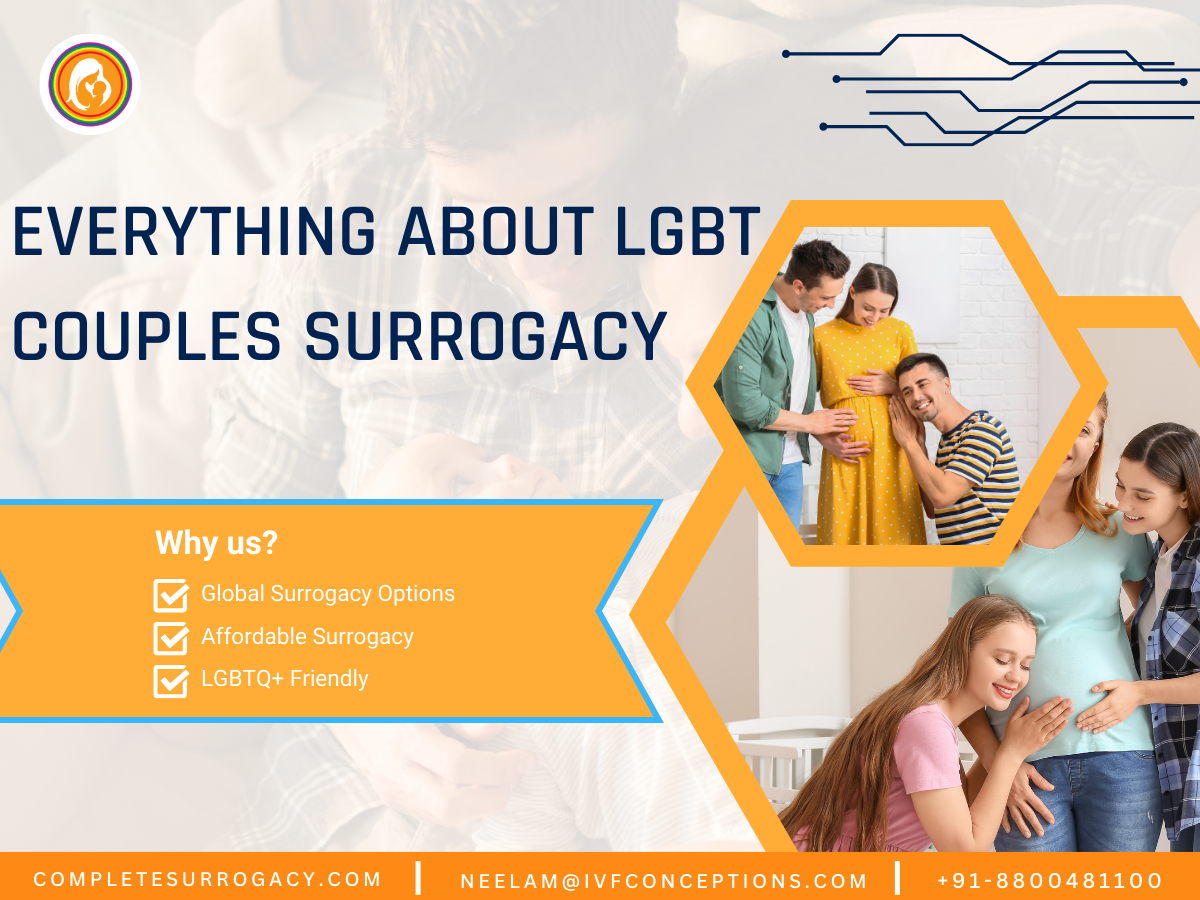Everything About LGBTQ+ Couples Surrogacy

The dream of building a family is universal, transcending sexual orientation and gender identity. For LGBTQ+ couples, surrogacy is often the most viable option to have children who are biologically related to them. While the process of surrogacy for LGBTQ+ couples is similar to that for heterosexual couples, there are unique considerations and challenges that need to be addressed to ensure a smooth and successful journey.
- Book an online appointment: Get a free online consultation.
- Call\W:+91-8800481100 Email:neelam@ivfconceptions.com
In this guide, we’ll cover everything about LGBTQ+ couples’ surrogacy, including legal considerations, emotional support, and financial planning. Understanding the surrogacy process for same-sex couples and how to navigate the specific legalities and medical options available is key to a positive experience.
Surrogacy Options for LGBTQ Couples
Surrogacy provides LGBT couples, particularly gay and lesbian couples, the opportunity to have children who share a genetic connection with them. Here’s how the process typically works for each:
- Gay Couples: Typically, gay couples use an egg donor and then opt for gestational surrogacy, where the surrogate carries an embryo created using the donor’s egg and one of the partner’s sperm. Some couples choose to fertilize multiple eggs with sperm from each partner, which can result in twins or siblings who are genetically related to each partner.
- Lesbian Couples: Lesbian couples generally require a sperm donor. They can opt for gestational surrogacy, where one partner provides the egg and the surrogate carries the embryo, or one partner may carry the baby herself using either her own egg or her partner’s egg.
More Resources to Read:
Infertility Treatment and Surrogacy Process
9 Factors To Improve IVF Pregnancy Rate
International Surrogacy Options Worldwide
Surrogacy Guide for Surrogate Mothers
Key Considerations in LGBTQ Surrogacy
| Consideration | Details |
| Genetic Link to the Child | Deciding which partner will have a genetic connection to the child is crucial. Gay couples need to decide whose sperm to use, while lesbian couples must decide whose egg to use or who will carry the pregnancy. |
| Known vs. Anonymous Donors | Couples must decide whether to use a known donor, such as a friend or family member, or an anonymous donor. Each option has its advantages and challenges. |
| Legal Considerations | The legal landscape can be more complex for LGBT couples, with laws varying by country and state. It’s important to consult with a legal expert who specializes in surrogacy for LGBT couples. |
Pros and Cons of LGBTQ Surrogacy
Pros
- Intentional Matching: Many surrogates choose to work specifically with LGBT couples, leading to strong, intentional matches.
- Biological Connection: Surrogacy allows one or both parents to have a genetic link to their child.
- Lifelong Relationships: The surrogacy journey often leads to lifelong bonds between the surrogate and the intended parents.

Cons
- Potential Discrimination: LGBTQ couples may face discrimination from some surrogacy professionals, surrogates, or donors.
- Higher Costs: Surrogacy can be more expensive for LGBTQ couples, especially if additional legal steps or donor services are required.
- Complex Legal Landscape: The legal aspects can be more complicated and require careful navigation to ensure that both parents have legal rights to the child.
Cost of LGBTQ Surrogacy
The same-sex surrogacy cost is almost the same as hetero couples, except some additional fees like egg donor fee and additional legal fee. Surrogacy costs can be significant and vary depending on the location, the type of surrogacy, and the specific needs of the intended parents. Here’s a detailed breakdown:
| Cost Component | Estimated Cost (USD) | Details |
| Egg Donation | $15,000 – $30,000 | Includes donor compensation, medical screenings, and legal fees. Costs may increase with a traveling or experienced donor. |
| Sperm Donation | $5,000 | Includes screening and compensation. Generally less expensive than egg donation. |
| Gestational Carrier Compensation | $30,000 – $60,000 | Compensation for the surrogate. Additional costs may include health insurance if her policy does not cover surrogacy. |
| IVF Costs | $15,000 – $25,000 per cycle | Includes procedures to create and implant embryos. Most health insurers do not cover IVF for same-sex couples. |
Legal Landscape for LGBTQ Surrogacy
The legal landscape for LGBTQ surrogacy varies significantly across the globe. Countries such as the USA, Canada, and some European nations offer supportive legal frameworks, while others, like Russia, Ukraine, and Georgia, prohibit surrogacy for same-sex couples. Colombia is emerging as a popular and affordable destination for LGBT surrogacy due to its supportive laws.
In many jurisdictions, LGBTQ couples may need to go through additional legal processes, such as pre-birth orders, second-parent adoptions, or co-parenting agreements, to ensure that both partners are legally recognized as parents.

Additional Factors to Consider
- Parenting Challenges: LGBTQ parents may face unique challenges, including societal prejudice and the need to explain the surrogacy process to their children. It is crucial to ensure a supportive environment and have open conversations with children about their origins.
- Choosing the Right Professional: It’s essential to work with surrogacy professionals who have experience and sensitivity towards LGBT couples. Look for agencies that offer specialized support and counseling tailored to the LGBT community.
- Surrogacy for HIV-Positive Individuals: HIV-positive individuals can still have children through surrogacy without transmitting the virus to the child or surrogate, thanks to advanced medical protocols like the Special Assisted Reproduction Program (SPAR).
More Resources to Read:
Surrogacy Guide for Surrogate Mothers
Surrogacy Guide for Intended Parents
How does the surrogacy process work
Conclusion
Surrogacy offers a pathway to parenthood for LGBTQ couples, but it requires careful planning, legal guidance, and financial preparation. With the right support, LGBT couples can successfully navigate the surrogacy journey and achieve their dreams of starting a family.
For more information on surrogacy options worldwide, or to explore your options with experienced professionals, contact us. Our consulting services are free, and we are here to help you every step of the way.
If you’d like to learn more about IVF, Egg Donation, or surrogacy services globally, check out the rest of our website at Complete Surrogacy Agency. We offer legally secure and affordable surrogacy consulting services for FREE.
Complete Surrogacy: Your Trusted Partner in International Surrogacy
At Complete Surrogacy, we have over 15 years of experience in international surrogacy, guiding 4,000+ intended parents worldwide. We provide safe, ethical, and affordable surrogacy solutions for single parents, LGBTQ+ couples, and heterosexual couples.
As members of EFS and ESHRE, we adhere to the highest ethical and professional standards. Our expert team is committed to providing accurate, compassionate, and transparent guidance, ensuring a legally secure and smooth journey to parenthood.
Let us help you build your family with trust, care, and integrity.
Get in touch for one FREE Surrogacy Consultancy!

FAQs About LGBTQ Couples Surrogacy
1. Is surrogacy legal for LGBTQ couples?
Surrogacy laws vary by country and even by state or region within a country. In many places like the USA, Canada, and certain European countries, surrogacy is legal and accessible to LGBT couples. However, in some countries like Russia, Ukraine, and Georgia, surrogacy is restricted or prohibited for same-sex couples. It’s essential to consult with a legal expert to understand the specific regulations in your desired location.
2. Can both partners in a same-sex couple be legally recognized as parents?
Yes, both partners can be legally recognized as parents, but the process can vary depending on the jurisdiction. In some places, this may require additional legal steps such as a second-parent adoption, pre-birth order, or co-parenting agreement. It’s important to work with an attorney who specializes in surrogacy law to ensure all legal requirements are met.
3. How do we choose between using an anonymous or known donor?
The choice between an anonymous or known donor is a personal decision that depends on your comfort level, the potential relationship with the donor, and legal considerations. Known donors, such as friends or family members, may offer a sense of familiarity, but this can also complicate relationships. Anonymous donors provide privacy but may limit future contact. Both options have legal and emotional implications, so it’s important to weigh them carefully.
4. What are the costs involved in LGBT surrogacy?
The costs for LGBT surrogacy can vary widely depending on the location, type of surrogacy, and additional services required. Typical expenses include egg or sperm donation, gestational carrier compensation, IVF procedures, legal fees, and agency fees. On average, the total cost can range from $100,000 to $150,000, but this can vary depending on specific circumstances.
5. How do we find a surrogate who is open to working with LGBT couples?
Many surrogacy agencies specifically match surrogates with LGBT couples. It’s important to work with an agency that has experience and a supportive approach to LGBT surrogacy. When choosing a surrogate, clear communication about expectations and values is crucial to ensure a good match.
6. Are there any medical risks involved in surrogacy for LGBT couples?
The medical risks in surrogacy are generally the same for LGBT couples as they are for heterosexual couples. However, if HIV-positive individuals are involved, additional medical protocols like the Special Assisted Reproduction Program (SPAR) are implemented to prevent transmission of the virus to the surrogate or the child. It’s important to consult with fertility specialists to understand all potential risks and protocols.
7. What support is available for LGBT couples during the surrogacy process?
Many surrogacy agencies offer specialized support for LGBT couples, including counseling, legal advice, and matching with surrogates who are specifically open to working with LGBT families. Support groups and online communities can also provide valuable resources and emotional support throughout the journey.
8. How do we explain surrogacy to our child?
Explaining surrogacy to your child is a personal decision and should be done in a way that is age-appropriate. Many parents choose to start the conversation early, using simple language to explain how they were born. Books and resources tailored to children of LGBT parents can also be helpful in facilitating this conversation.
9. Can an LGBT couple have twins through surrogacy?
Yes, LGBT couples can have twins through surrogacy, especially if both partners’ sperm is used to fertilize multiple eggs. This can result in twins who are half-siblings, with each having a genetic connection to one of the partners. However, this approach may involve additional medical and legal considerations.
10. What are the challenges unique to LGBTQ surrogacy?
LGBT surrogacy can involve challenges such as potential discrimination, a complex legal landscape, and higher costs due to the need for donor services or additional legal protections. It’s important to work with experienced professionals who understand these challenges and can provide the necessary support to navigate them successfully.

Author Bio: Neelam Chhagani is an International Surrogacy Expert with 15 years of experience in the fertility and surrogacy domain. As the founder of IVF Conceptions and Complete Surrogacy, she has guided over 4,000 intended parents worldwide on their surrogacy journey to parenthood. Recognized as a trusted authority, she specializes in holistic infertility solutions and third-party reproduction consulting.
Holding an MA in Counselling Psychology and a PGD in Mental Health, Neelam is a proud member of the European Fertility Society (EFS) and the European Society of Human Reproduction and Embryology (ESHRE). She is also a leading surrogacy blogger, providing valuable insights into ethical and practical surrogacy solutions.
Since 2010, committed to supporting ALL family types, Neelam has been passionate about helping intended parents grow their families with compassion, integrity, and a focus on secure and affordable surrogacy options Globally.
Learn more about Neelam:
https://www.ivfconceptions.com/neelam-chhagani-surrogacy-consultant/
https://www.linkedin.com/in/neelam-chhagani-92892229/















I was introduced to Neelam by a friend who worked with Neelam for surrogacy. Neelam is absolutely wonderful. I am a single male and the journey to fatherhood is not that easy. Neelam connected me to a program ideal for my circumstances. She was with me throughout the pregnancy providing advice and guidance along the way. I am so grateful I found her and am thrilled today that I have a beautiful daughter. I highly recommend Neelam to anyone who is on a journey to become a parent. Having a child has changed my world for the better. I wish others success with their own journey and recommend you connect with Neelam to find a path that is best for you.
SA (USA)